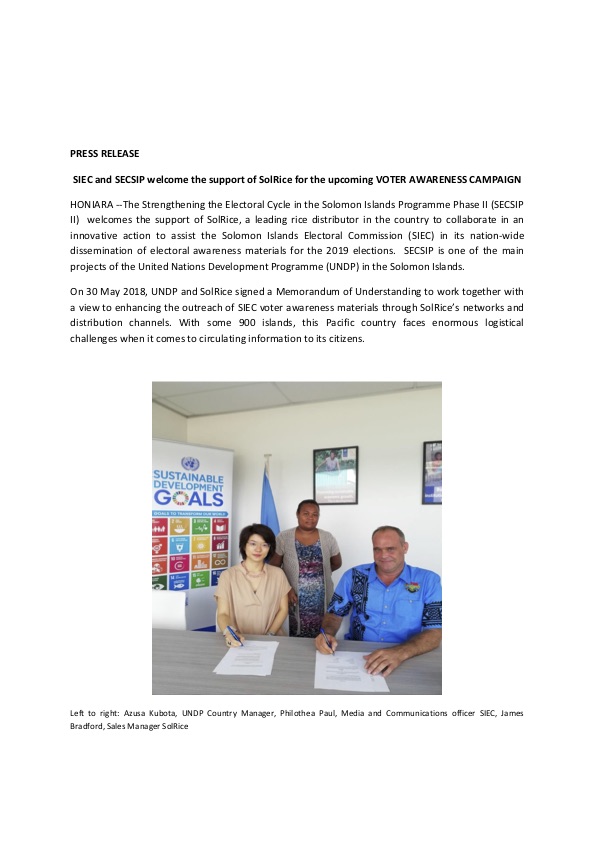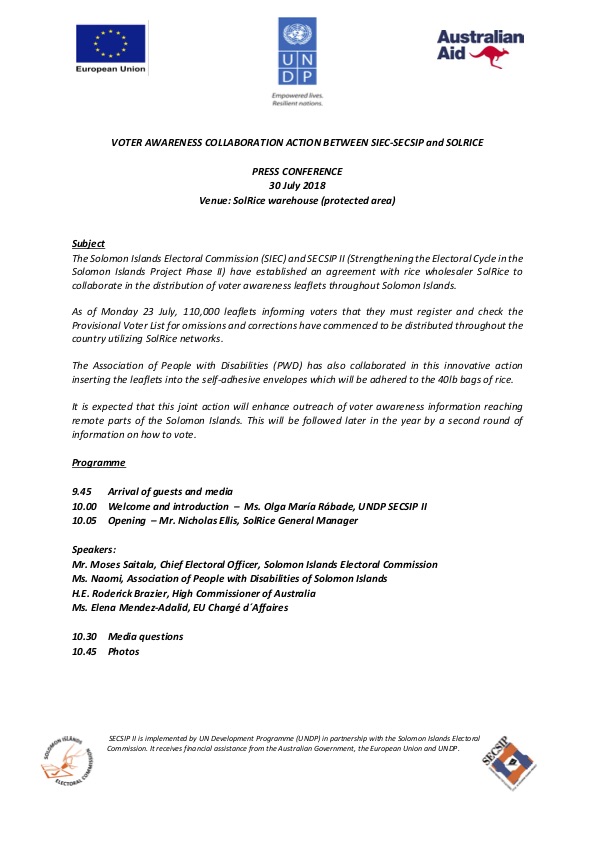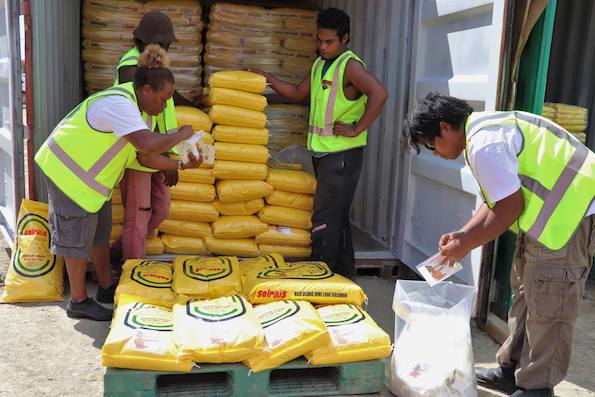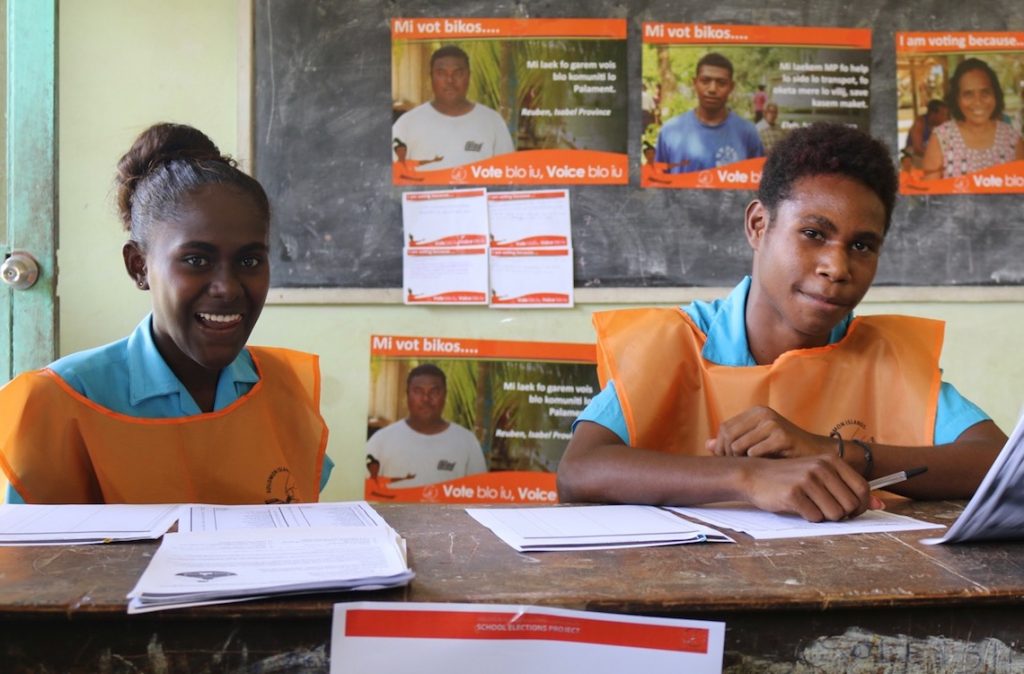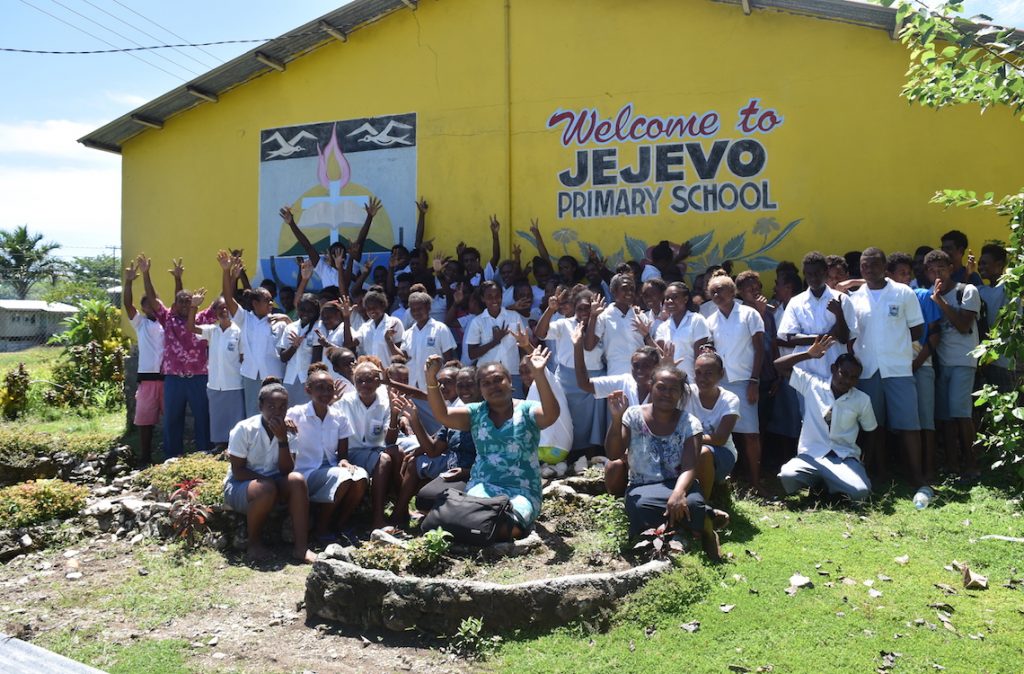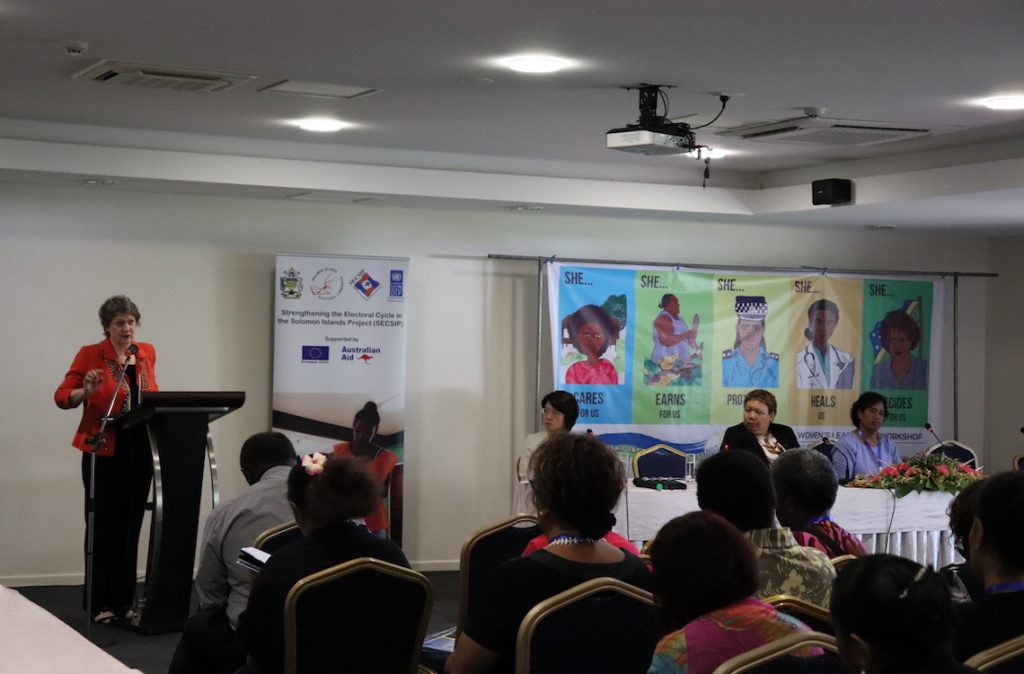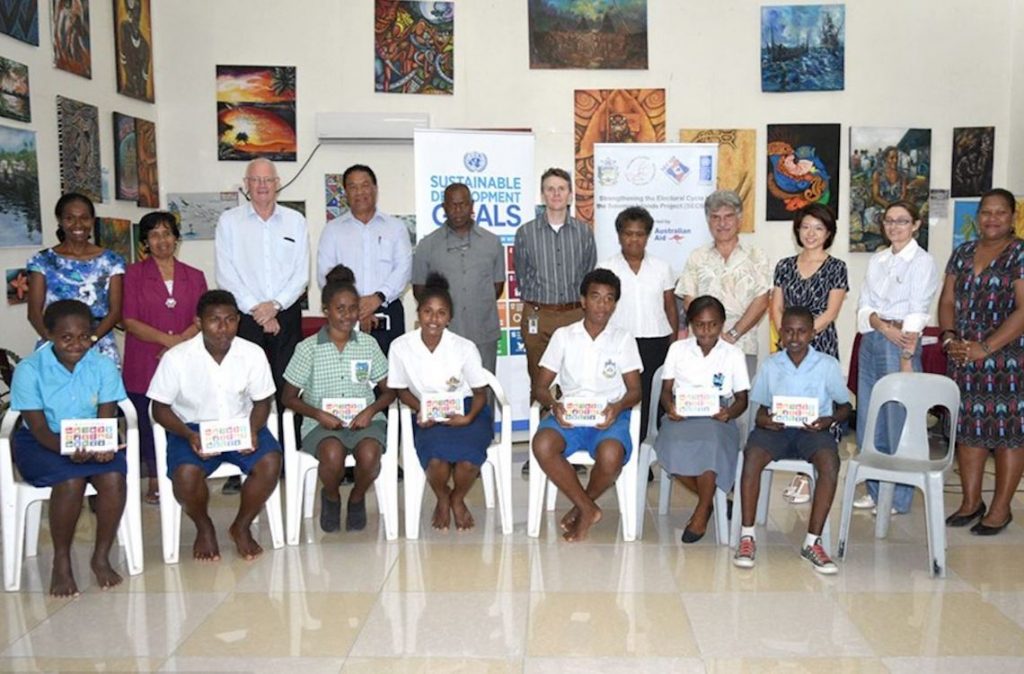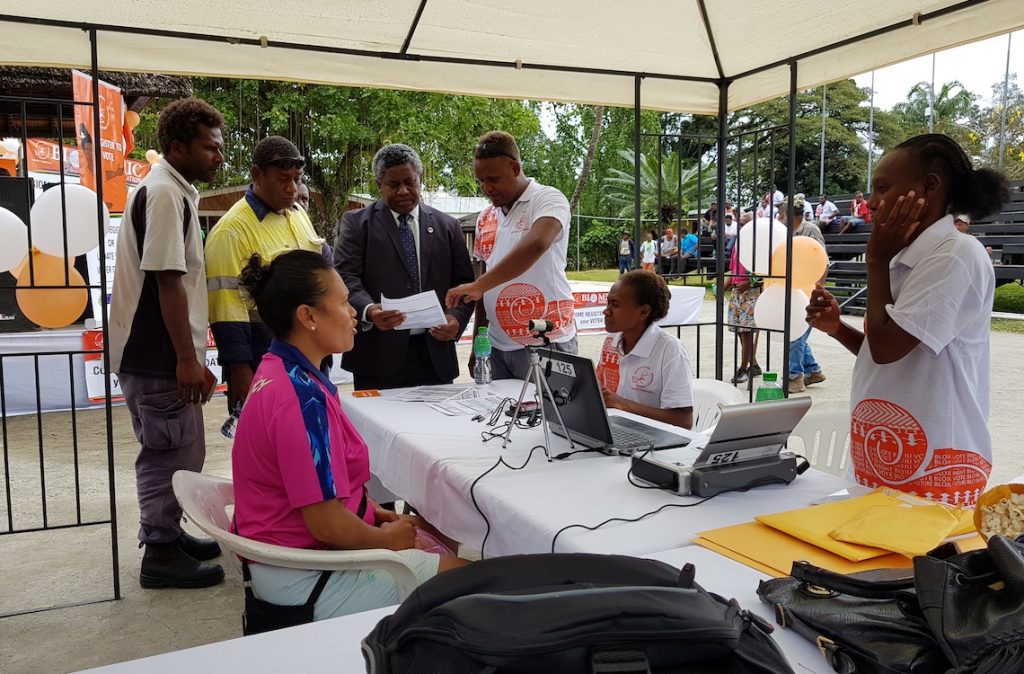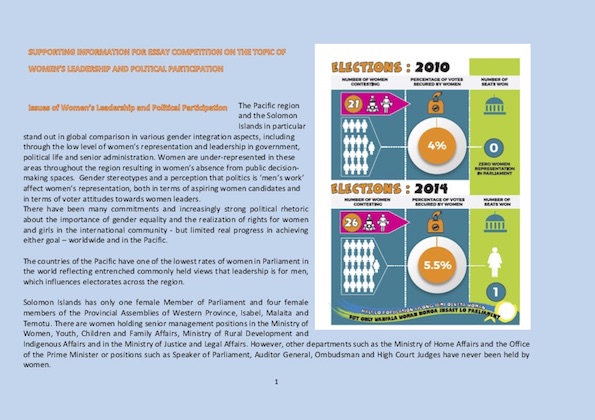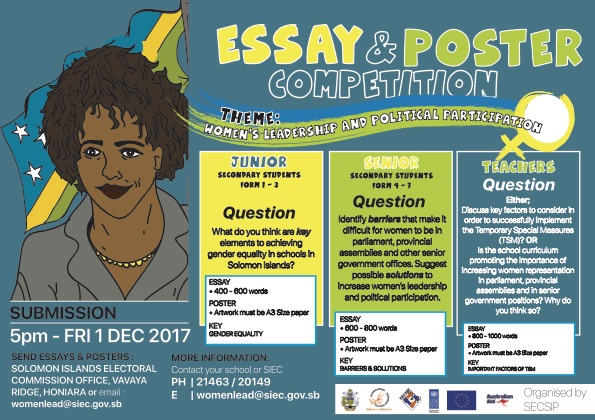Our activities
Project's activities
- Support to the procurement of voter registration equipment and election materials;
- Enhancement of the sustainability of voter registration operations with knowledge transfer;
- Support to Solomon Islands Electoral Commission (SIEC) staff for the creation of the voter list for the 2019 General Elections;
- Funding for the construction of a dedicated data centre at the SIEC and reinforcement of its office equipment and infrastructure including enhanced security;
- Upgrade of the SIEC website with advice on design and content to disseminate electoral information and enhance the visibility of the SIEC;
- Media & Elections training for journalists;
- Gender research on women’s political participation and support to women’s political participation with special focus on women candidate training;
- Essay and poster competition on women’s leadership and political participation;
- Creation of new voter awareness materials and facilitation for the establishment of a voter awareness group bringing together civil society organisations and institutional stakeholders;
- School elections project to raise awareness on the electoral process and democracy building;
- Facilitation of high profile visit by former UNDP Administrator and Former Prime Minister of New Zealand Helen Clark with organisation of workshop of women’s political participation and leadership. The project helped organise the Solomon Islands national Women in Leadership training from 21 to 24 August 2018. Ms Clark took an active part in some of the sessions, providing valuable insights on issues surrounding women’s leadership. Participants included community, provincial and national women leaders and aspiring candidates for the National General Elections to be held in 2019. Speakers included leading women for the political sphere of Papua New Guinea, Fiji, Bougainville and Vanuatu.
- Capacity building support to polling staff to conduct NGE 2019 and by-elections and provincial elections
- Support to women candidate including candidate school, women resource centre, women support network
- Involvement of national observers and CSOs for NGE and provincial election monitoring
- Post NGE 2019 lessons learned documentation
- Post NGE 2019 Knowledge,Attitude and Practice survey to find out the impact of voter awareness activities
- Outstanding Women (OW) SI initiative to find out women leaders from the community
- Radio talk back show with the 3 women MP’s
- Assistance to the Electoral Office in preparation for the Central Honiara, North East Guadalcanal and South Choiseul upcoming 2020/2021 by-elections
Voter awareness collaboration between SECSIP, SIEC and SolRice
Achievements
The Strengthening Electoral Cycle in the Solomon Islands Project (SECSIP) is implemented by the United Nations Development Programme (UNDP) in partnership with the Solomon Islands Electoral Commission (SIEC).
It receives financial assistance from the European Union, the Government of Australia, and UNDP.
Its second phase (SECSIP II – 1 July 2017 – 30 June 2020) continues to build on the achievements of the first phase (1 July 2013-30 June 2017).
The project has furthered its commitment to reinforcing the capacities of the Solomon Islands Electoral Commission Office (SIECO) while building synergies and partnerships with a wide range of national stakeholders.
This covers a wide range of government institutions as well as civil society actors to ensure an improved enabling environment for inclusive elections.
The overarching objective is to strengthen the link between the electoral cycle and other key governance processes and institutions, and contribute to social cohesion and the development of a pluralistic society.
In 2017, the project delivered a foundation training for political parties, youth awareness actions including a school project on electoral awareness and a competition on women’s leadership and political participation for secondary school students and teachers, media trainings on electoral related topics held in Honiara, Gizo and Auki.
In 2018, a critical year for preparations for the 2019 General Elections, efforts have been stepped up under SECSIP II.
Support to SIEC has increased with reinforced technical expertise on electoral operations, voter awareness, civil society organisations support and backing for women’s political participation in order to contribute to ensure a democratic, genuine, acceptable and inclusive election.
Solomon Islands held its national general election (NGE) on 3 April 2019. The project’s core support to strengthen the capacities of the Electoral Office (EO) as well as the technical assistance to voter awareness activities made a key contribution to the implementation of the 2019 national general election.
For the first time ever in the history of Solomon Islands, there are three women Members of Parliament (MPs). Two women were simultaneously elected as Members of Parliament (MPs)in NGE 2019 and one was elected as a result of the by-election for East Makira by-
election held on11 December 2019. Despite this still remains a low rate of women representation, it is a step ahead in the context of the Pacific region which has the lowest rate in world of women representation with some neighboring countries such as Papua New Guinea orVanuatu which not have any women MPs. Furthermore, an analysis of the election statistics provides some positive indicators, for example:
- the percentage of women candidates has increased to close to 8%, which is an improvement compared to the 5.7% rate in2014 elections;
- in 2019, 4.49% of the total number of valid votes were cast for women candidates, compared to only 2.72% in 2014;
- in 2019, one woman candidate received more than 50% of the constituency votes and 3 other women candidates obtained between 30-40% of the total votes in their constituencies.
The voter turn-out was estimated at 86% of the total number of registered electors. SECSIP core support included electoral operations as well as data management contributing to mitigate some of the limited functionalities of the voter registration system and the management of electoral results.
During the first quarter of 2019, SECSIP assistance to enhance inclusiveness included innovative voter awareness activities such as the use of SolRice network for the dissemination of a voter education booklet. The project also supported the Electoral Office on face-to-face voter awareness actions conducted at market places.
The project’s approach for increasing voter awareness helped to reach different segments of people such as remote communities, youth and people with disabilities (PWD). To further improve the inclusiveness in the electoral process, SECSIP organised a two-day awareness raising training for 22 people with special ability (9 male) in Honiara. The participants expressed their interest on the topics discussed noting that for the majority this was the first time they were invited to learn and discuss about the electoral process and their voting rights.
SECSIP established partnerships with civil society organisations (CSOs)at grass root level for voter awareness activities. For example, prior to the 2019 election, 15civil society organisations reported to reach 29 constituencies of 8 provinces and Honiara. The project also supported the production of three videos on ‘how to vote’, ‘youth messages to choose the right candidate’ and ‘electoral offences’.
Other tools included a telephone hotline, workshops with media professional on electoral related topics and radio programmes.
A Knowledge Attitude and Practice (KAP) study analysing changes in voter awareness and electorate behavior in comparison with 2014 elections was conducted and shared with wider stakeholders.
The project’s initiative to foster domestic observation through a partnership with OXFAM resulted in the accreditation and deployment of 168 domestic observers (including 74 women, 7 people with disability) to different polling stations. For the first time people living with disabilities were included in this process.
The Electoral Office, with technical support from the project, conducted three lessons learned workshops in Gizo, Auki and Honiara. The exercise provided a forum to share experiences on the 2018 voter registration and on the 2019 national general elections identifying best practices resulting in a learning tool and contributing to the building of the institutional memory.
Discussions included issues related to ‘ordinarily residence’ criteria, the possible expansion of the newly introduced pre-poll to other categories of voters, or measures to enhance accessibility to polling stations.
Following these workshops, UNDP Regional Electoral Adviser based in Bangkok conducted a one-week mission during which he met relevant electoral stakeholders and held discussions to assist in the identification of needs for future support.
With respect to support to women candidates, SECSIP implemented a multi-layered approach which included capacity building actions(candidate schools), and support through resource centres. This included the organisation of two women candidate schools to improve the capacities of women candidates and the establishment of four Women Candidate Resource Centres equipped with computers and printing facilities in Malaita, Makira, Isabel and Honiara.SECSIP handed over office equipment provided to women resource centres to hosting entities included laptop, printers and other IT equipment.
Trainings were also provided to the two female candidates who ran for the 11 December 2019 by-elections with one winning the seat whilst the other female candidate was second runner up.
The project also supported the provincial assembly elections by organising trainings for 16 women candidates running for provincial government elections in Isabel, Malaita, Guadalcanal and the Central Provinces. At present, five women have been elected members of provincial assemblies.
Five outstanding women elected in five provinces through Outstanding Women (OW) initiative.SECSIP launched the ‘Outstanding Women (OW) of Solomon Islands’ initiative on 23 July 2019 to find out most valued women in 10 provinces.
